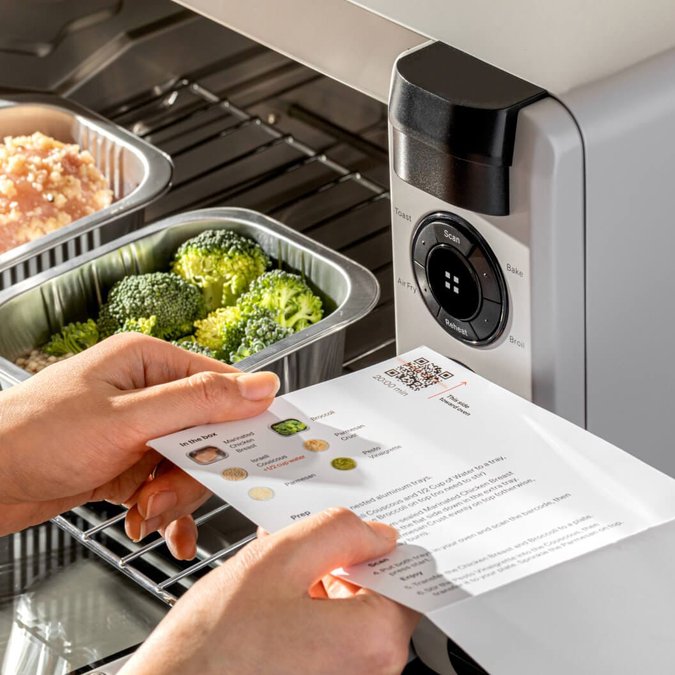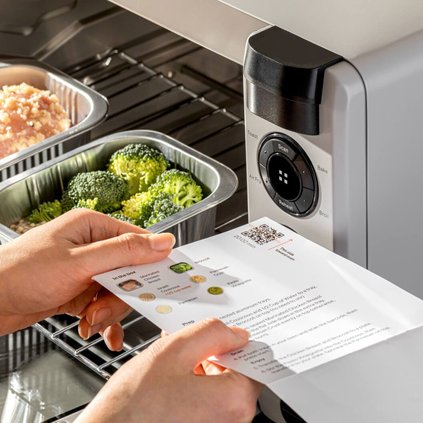There was a time when man set himself apart from the other creatures.
He evolved beyond hunting and gathering.
Man figured how to store food.
He was able to preserve everything from meat to fruits and vegetables long before tech brought us refrigerators and food dehydrators.
He learned how to cook, mix ingredients together, and create meals.
Then along came the marvels - or curses depending upon how you look at things - of the 20th century.
The list includes frozen food, processed foods, electric and natural gas stoves, microwaves, fast food joints, delivery services and a host of contraptions.
They make the slicing, dicing, and blending of food such a breeze we pursue the creation of concoctions that mankind not too long ago would have never attempted if for no other reason they would have starved to death trying to fashion them using primitive tools.
Now we have Tovala.
It’s a meal service delivery model that would make Tim Cook envious.
For $49 to $99 — or $299 to $349 if you don’t act quickly enough for the spring sale — you get a smart oven.
It is indeed smart, especially from a business model crafted to prey on people who have too much money in their hands.
Tovala is a closed business model meaning consumers rely on them not to just to purchase meals but the devices to make them edible once they are delivered.
The smart oven cooks meals you order from Tovala come with QR coding.
You scan the QR code using a reader on you your Tovala smart oven. The QR code instructs the smart oven how to precisely broil, bake, or steam to Tevala’s specifications by connecting with the cloud.
And you can sip mint juleps while downloading videos from your smartphone on the balcony and not worry about a thing.
Tovoa, via the cloud, will turn off your smart oven when it is through cooking the meal to Tovala’s precise directions and then send you a notification via an app on your phone to let you know dinner is ready.
No prep.
No messing with settings.
No dinner bell.
No thinking beyond robotic app orders, opening the door to pick up a Tovala package, and being able to do a task a monkey can be trained to do which is insert food packages in oven and then scan.
Of course, your Internet can’t be on the fritz or you can’t cook.
And each meal for one person starts at $12.99.
You can feed yourself three times a day for an entire week for $272.79.
Obviously, such people don’t fret much over the cost of a dozen eggs,
Welcome to de-evolution.
There was a time not too long ago when you had to hunt, fish as well as plant and harvest to eat.
Not only did that require a task that is a four letter word - “work” - but it required you to know a lot of basic knowledge in order to acquire, grow, prep, and cook.
Now there’s an app and a QR code for that assuming your Internet works.
No worries about nutrition.
No reason to learn basic skills.
No need to experiment on your own.
Just sit back and take what Tovala doles out — at a price ultimately that will allow them to join Jeff Bezos in the race to acquire the world’s biggest and gaudiest yacht.
It is a tech extension of moms feeding a helpless infant or young child.The only difference is venture capitalists don’t bust doors down to underwrite moms with tons of cash to burn through for a “business plan” that gets their kids hooked on relying on mom to feed them.
Yes, it is convenient.
Time is money.
And there are better things to do such as roam the Internet in pack mentality mode criticizing, berating, humiliating, and vilifying complete strangers or spend quality time gaming or watching TikTok videos.
There are obvious downfalls.
The less you learn about preparing food even if simply reading instructions on a package and punching in numbers accordingly the less independent you are.
It may seem like a stretch that someday people may be helpless at remembering how to do things when it comes to basic food preparation, but ponder this for a moment: How many of us can remember the phone numbers of 10 people we call on a routine basis now that our phones have become smart?
There’s a lot to be said about rote learning and being able to even wander the aisles of a supermarket to collect the ingredients for a meal.
Don’t laugh but the day may come when the “cloud” goes down and our smartphones and smart ovens are dead for an extended period of time and we find out we may lack the basic skills needed to eat.
This may happen sooner than you think given the Zager & Evans “In the Year 2525” timeline is already being compressed thanks to test tube babies and technology disrupters hellbent on amassing more net worth than Elon Musk are working overtime to make our legs, arms, and minds useless.
That said it’s likely many people snagged by Tovala aren’t flush with cash.
While they may not be living on Tobacco Road, they can ill afford in the long haul when it comes to establishing longterm financial security to keep squandering large amounts of their income on convenience.
Back in 1960, 18 percent of the typical American household income went for food including 14 percent for what was eaten at home and 4 percent for food consumed away from home. The U.S. Department of Agriculture’s Economic Research Service noted by 2020 that had dropped to 8.6 percent for food. That was split between 5 percent at home and 3.6 percent away from home.
A spot check with two late Twenty-Something couples grossing over $100,000 points to a figure that is higher — about 15 to 20 percent — due in large part by an almost daily Door Dash habit intermingled with dining out and ordering online prepackaged meals.
As for food bought at grocery stores, fruits stands or raised in their yard Old Mother Hubbard’s cupboards were crammed with food in comparison.
Both couples rent, both bemoan the fact they are always running out of money, and one is convinced they will never be able to afford to buy a house.
If they keep lining the pockets of investors of no-think app-based purveyors of convenient food that even cooks itself, they’ll be in the same boat 20 years from now while being at the mercy of the Amazon cloud to make sure they can secure food and be able to cook it.
The views are of Dennis Wyatt and not necessarily 209 Multimedia. To contact Dennis Wyatt, email dwyatt@mantecabulletin.com






